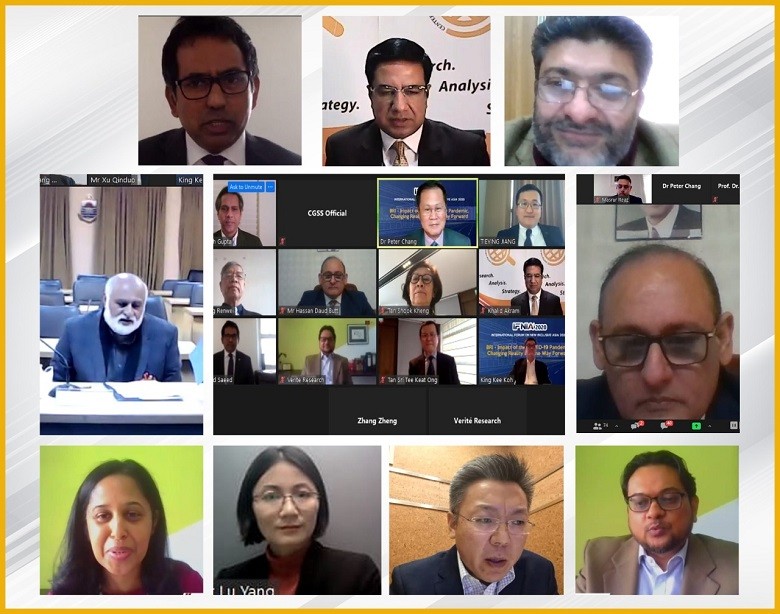ISLAMABAD, Pakistan: The International Forum on New Inclusive Asia 2020 was held on Thursday under the theme “BRI- Impact of the COVID-19 Pandemic changing reality and the way forward”.
The Forum was co-organized by the Islamabad-based Center for Global & Strategic Studies (CGSS), Malaysia’s Center for New Inclusive Asia, and Sri Lanka’s Verite Research Strategic Analysis in partnership with the Institute of the Belt and Road Initiative, Tsinghua University.
The Forum was supported by BRSN, the official international network of more than 100 BRI think tanks worldwide.
A panel of 16 distinguished experts/scholars from eight Countries participated at IFNIA 2020 including Pakistan, Sri Lanka, Malaysia, Maldives, China, Japan, Thailand, and Bangladesh.
In his welcoming remarks, the Executive Director CGSS Lt Colonel (retd) Khalid Taimur Akram elaborated the unique aspects of BRI as a mega project to connect the region. He also stated that in human history, Coronavirus is one of the devastating pandemics.
Lt Colonel (retd) Khalid Taimur Akram highlighted the vulnerabilities of the pandemic on the BRI project due to COVID-19 as the pace of many projects was halted.
The Executive Director CGSS said that BRI has also proven resilient despite the shock from the pandemic. This envisaged, in the post-pandemic era that the sustainability of BRI will open a new door of opportunities and connectivity.
The Vice-Chancellor University of the Punjab Professor Dr. Niaz Ahmad Akhtar in his topic presented a speech on “Giving New Impetus to BRI in the Post Pandemic Era”.
Dr. Niaz Ahmad Akhtar highlighted the daunting impact of the pandemic on the educational system. He said that pandemic has made the education system to shift towards an online education system which has caused several hurdles.
However, due to the significant efforts of the University of the Punjab, Lahore, students are having special training and educational programs. The feasible mechanism has paved the way for teachers and students to connect through technology. Technology has a major role to play in the post-pandemic era for the promotion of higher education.
The Chief Executive Officer at the KP-Board of Investment & Trade (KP-BOIT) Mr. Hassan Daud Butt gave a comprehensive analysis of the impact on the infrastructure building under BRI.
Mr. Hassan Daud Butt said that BRI is bringing all sectors closer but due to pandemics, the vulnerability has been faced mainly in transport and infrastructure building mechanism. He also suggested that a proper integrated mechanism and agenda is needed in the BRI forum which deals with the problems associated with infrastructure and transport development.
The Director of Area Study Centre (Russia, China & Central Asia) at the University of Peshawar Professor Dr. Shabir Ahmad Khan presented a speech on the topic “Transforming the Landscape of BRI: New Approaches and Goals in the Post COVID-19 World”.
Dr. Shabir Ahmad Khan highlighted the potential of China in the era of a pandemic. He elaborated that the areas of cooperation in this time of pandemic has gone beyond its boundaries. China has supported BRI countries in the medical sector as well as to combat the pandemic. He also appreciated the role of China in strengthening the two important factors: digitalization with the health sector. He envisaged that in the post-pandemic era, China will be the emerging power to sustain its economy and help BRI Countries.
The Maldives Parliamentarian and the Member of National Security & Foreign Relations Committee Mr. Mohamed Saeed in his speech on “Impact of the Pandemic on Economic Development in the Maldives: Challenges and the Way Forward” highlighted the issues connected with the tourism sector.
Mr. Mohamed Saeed elaborated the fact that the bread and butter of Maldives is associated mainly with the tourism sector. Due to pandemic, it has affected massively in lowering the ratio of tourism. Also, he said that all over the world tourism is impacted and there is a need of more political and economic collaboration to solve the common issues.
The other panelists of the Forum said that the environmental factor is one of the serious concerns. Because of climate change and now the pandemic, the economies have suffered badly. So under BRI, a proper mechanism should be developed to address the common issues of climate change, pandemic, and medical assistance.
The panelists were of the view that by sharing information, building trust, and reduce political differences, BRI would be strengthened more in connecting the regions.
Moreover, the main focus remained on the aspect of infrastructure development and integrated connectivity system, financing, and funding of BRI projects and information orientation policies. All these will further pave the way for building trust and resilience and increase economic development.
The panelists of the IFNIA Forum 2020 included:
- Mr. Koh King Kee President, Centre for New Inclusive Asia, Malaysia
- Dr. Peter Chang Deputy Director, Institute of China Studies, University of Malaysia
- Mr. Tan Sri Ong Tee Keat Chairman, Centre for New Inclusive Asia, Malaysia
- Professor Dr. Shi Zhiqin Director, Institute of the Belt and Road Initiative, Tsinghua University
- Dr. Nishan de Mel Executive Director, Verité Research, Sri Lanka
- Mr. Tang Rui, The Chargé d’Affaires Ad Interim Embassy of the People’s Republic of China in Malaysia
- Mr. Jiang Tieying BRSN Representative, Research Fellow at National Think Tank of Xinhua News Agency
- Professor Huang Renwei Executive Vice Director, Fudan Institute of Belt and Road & Global Governance Former Vice President of Shanghai Academy of Social Sciences
- Professor Dr. Kriengsak Chareonwongsak Chairman, Nation Building Institute of Thailand
- Professor Dr. Rong Ying Vice President and Senior Research Fellow of China Institute of International Studies (CIIS)
- Dr. Masrur Reaz Chairman and Founder, Policy Exchange of Bangladesh
- Dr. Guanie Lim Incoming Assistant Professor at National Graduate Institute for Policy Studies (GRIPS), Japan
- Dr. Dinusha Panditaratne Advisor, Verité Research, Sri Lanka Former Executive Director, Lakshman Kadirgamar Institute of International Relations and Strategic Studies (LKI)
- Dr. Mao Weizhun Associate Professor in International Politics at the School of Government, Nanjing University
- Mr. Sourabh Gupta Senior Asia-Pacific International Relations Policy Specialist, Institute for China-America Studies, Washington DC
- Mr. Xu Qinduo Host of Dialogue Weekend, CGTN Senior Fellow at Pangoal Institution Member of International Board of Experts of Center for Global and Strategic Studies (CGSS), Pakistan
- Dr. Lu Yang Research Fellow, Institute of the Belt and Road Initiative, Tsinghua University Resident Scholar, Carnegie-Tsinghua Centre for Global Policy




